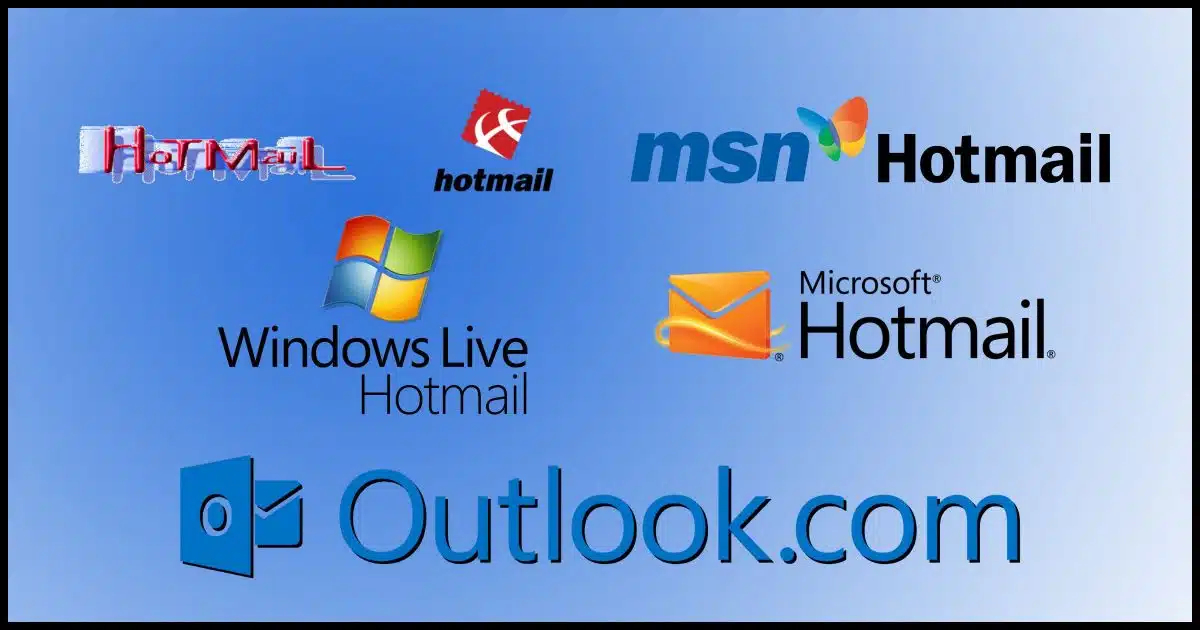Nothing.

It’s no joke.
Microsoft continues a long history of confusing the heck out of us with the names they choose for their services — and then changing those names as they go along.
Outlook.com is what we once knew as Hotmail, which was also called MSN Hotmail, and was also Windows Live Hotmail. That’s relatively easy, albeit confusing. But there’s more to it than that.
For the record: none of this involves losing any email. That’s something else entirely.

Where is Hotmail and what is Outlook.com?
Hotmail has been rebranded multiple times and is now Outlook.com. Your old Hotmail account and emails should still be accessible via Outlook.com despite the name changes. If emails are missing, it might be due to account hacks or other issues, not the rebranding itself. Check Outlook support if problems persist.
Today, they’re all the same
All the email addresses on those domains — Outlook.com, Hotmail.com, Msn.com, and Live.com (and a few others) — are essentially the same. Aside from the different email domains, they all represent a single online email service provided by Microsoft.
That’s now known as Outlook.com. If you have an email address on any of those domains, you access your Microsoft-based email on outlook.com.
So how did we get here?
Help keep it going by becoming a Patron.
Hotmail begat MSN Hotmail begat Windows Live Hotmail
In the beginning was HoTMaiL. The capitalization represents a bizarre kind of reverse acronym mash-up referencing HTML mail. The moniker “Hotmail” is what stuck.
After purchasing Hotmail, Microsoft integrated it with their burgeoning line of online services and branded them all as MSN (for MicroSoft Network). What we used to call Hotmail became MSN Hotmail. Most people kept on calling it Hotmail. At the same time, several other MSN-branded services, like Instant Messenger and the MSN.com homepage, were also created.
Then Microsoft decided to de-emphasize MSN and renamed it Windows Live.
While the email service remained Hotmail in name, the domains that appeared in your browser’s address bar changed. Hotmail.com took you to URLs based on msn.com, live.com, and others (and for a while, passport.com, Microsoft’s first attempt to use your Microsoft email address as “one account for everything”).
Hotmail, which had become MSN Hotmail, became Windows Live Hotmail. Same service; just three different names over time.
Most people just called it Hotmail.
And then things changed again.
Everything begat Outlook.com
The most recent and massive change was when Microsoft completely replaced Hotmail.com and all other free email services they provided with outlook.com. (Which is the name of two other services they offer, but that’s another story.)
What was once Hotmail by any of its previous names is now Outlook.com.
Outlook.com remains the service you use to access your hotmail.com or any Microsoft email address. New email addresses are available only from outlook.com.
Missing email?
If you’re missing email, there’s something else going on. None of the name changes above should result in any lost email, period. Those changes only involved the name and the user interfaces.
Unfortunately, I do hear of missing Outlook.com email from time to time, although not necessarily in conjunction with a name change. Here are the types of issues I see.
- Temporary failures. You may not get a message at all, but check in again in, say, 24 hours. Your email may magically have reappeared.
- Silent account hacks. There are account compromises where the hacker doesn’t change your password. You can still log in but they wreak havoc on your account. Change your password — and everything else that might be used to recover your password — immediately.
- Traditional account hack. You indicated you had to reset your password to regain access to your account. This feels very much like a situation where a hacker has gotten into your account, changed your password, and deleted your email.
It might make sense to visit the Outlook.com support forums to see if others are experiencing the same problems, or post your experience there to get some help.
Ultimately, however, I have to fall back on my standard position regarding free email accounts: if your email disappears, it’s extremely unlikely you’ll ever get it back.
I hope you had it backed up somewhere.
Do this
You can certainly keep using your older hotmail.com or other Microsoft-provided email addresses. There’s no reason to change.
The only thing that changes is where you look for it: outlook.com. If you try to go to hotmail.com, you’ll be sent to Outlook.com.
While you’re at it, use your Microsoft-provided email address to subscribe to Confident Computing! Less frustration and more confidence, solutions, answers, and tips in your inbox every week.






Locked out of my hotmail e-mail account…2 weeks…tried everything from filling out recovery forms to virtual agents to on-line Live chats…all to no avail…..PLESE HELP!!!!!
Please carefully follow the account recovery or lost password steps as offered by Microsoft. If the recovery process doesn’t work for you — maybe you don’t have the recovery email or phone — MAKE SURE to follow the instructions CAREFULLY and COMPLETELY. If the recovery process can’t be made to work, and there is no customer service (common with free services), then I know of no way to recover the account. If that’s your situation I’m very sorry.
Regardless of whether you recover the account or not, I would encourage you to review the steps outlined in this article to avoid it ever happening again: https://askleo.com/a-one-step-way-to-lose-your-account-forever/
I was initially very confused as I was a Hotmail user and than they started to shift every thing to outlook, now its a little confusing but still i think this one is a lot better than what Hotmail used to be. If you guys are looking for more info on outlook then please check this article: {Link removed}
This was interesting. What IC is that Outlook.com is the biggest problem when they cane along.
On PC, Hotmail served me well for few years before and I required a decent working email address business wise.
I changed to gmail.com and no problem at all, this seemed to detach itself. The less I go into my PC email files … the better. Those old files serve no purpose other than stacking emails that you have to delete, plus its ugly to look at. So much easier to delete old junk and keep files clean Apples branches. Did this make sense, to you?
My friend has an msn.com account, I cannot reply to his msn.com mail! Would you suggest he get a gmail account to manage & simplify his life? Or is it the Apple products software which has ironed out the problems for users?
Hi, How did you get rid of outlook email or cancel it?
Depends on what you mean by “get rid of”. Just stop using it is my typical response, but it really depends on what you’re trying to accomplish.
I’ve tried ditching hot mail and live.com into Outlook.com and have found nothing but trouble now I can’t even reach my email..
Unfortunately, Outlook.com no longer allows you to fetch email from other accounts. The easiest way to consolidate your accounts is to use an email client like Thunderbird or Outlook (the new Outlook is so limited, I’d recommend Thunderbird). Or you can use an email provider that allows fetching from other accounts, such as gmx.com. GMX is a reliable service. It’s Germany’s biggest free email service provider. I’ve used it for over 25 years.